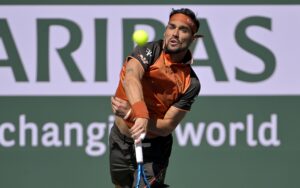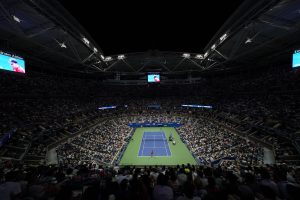As we approach the end of the first week of the French Open, the favourites for the Men’s Singles title remain what might be very loosely called “The New Big Three (At Least On Clay)”: Rafael Nadal, the 12-time winner of the event; Novak Djokovic, the World No.1 and No.1 seed, who is still to lose a match of any kind in 2020 (he was disqualified, of course, from the US Open rather than losing there); and Dominic Thiem, the new US Open Champion and twice runner-up at Roland Garros. The likelihood is that the winner of the event will still be one of those three, but if anyone else is to cause an upset and win the title it might just be Stefanos Tsitsipas.
Tsitsipas, of course, is hardly a complete outsider. The current World No.6, who is seeded fifth in Paris in the absence of Roger Federer, has been tipped by many tennis writers and observers to win a Major for nearly two years now, ever since he defeated Federer at the 2019 Australian Open to prevent the great Swiss from completing a hat-trick of Australian titles in the twilight of his career. Nevertheless, the fact that Tsitsipas is still in the French Open at all is a testament to his fighting spirit, and perhaps proof that he is ready to emulate Thiem and win his maiden Major.
Tsitsipas could easily have lost in the first round of the French Open. Arriving relatively late at the tournament after his run to the Final of the rearranged Hamburg Open last weekend, where he lost to Andrey Rublev, he soon found himself two sets down to Jaume Munar. The Spaniard is currently ranked outside the world’s top 100, but he is sufficiently comfortable on clay to have reached the French Open Boys’ Final in 2014 (which he also lost to a youthful Rublev). And like so many players at this autumnal French Open, Tsitsipas was almost literally caught cold, as Munar took the first two sets, before Tsitsipas rallied to win in five, 4-6, 2-6, 6-1, 6-4, 6-4.
Perhaps the most encouraging sign for Tsitsipas and his rapidly growing number of fans (some of whom are far more interested in “the Greek demi-god’s” good looks than his tennis ability) was that he obviously learned a lot from his performance against Munar, above all not to repeat it in the second round against Pablo Cuevas. The veteran Uruguayan, who is a clay-court specialist, was potentially an extremely tough and tricky opponent for Tsitsipas. However, as if determined not to replicate his slow start against Munar, Tsitsipas won the first set in rapid fashion and eventually won very comfortably in straight sets, 6-1, 6-4, 6-2.
Thus, in his first two matches Tsitsipas has arguably had the perfect start to a Major-winning campaign: the near-defeat that so many Major winners (especially first-time Major winners, as Tsitsipas would be in Paris) look back on afterwards as the wake-up call that they needed; followed by a comfortable straight-sets victory that would not have taken too much out of him.
The immediate forecast for Tsitsipas is also good. In the third round this weekend, he plays Aljaž Bedene, the former Brit who is now wholly Slovenian once again. Clay may just be Bedene’s best surface, but Tsitsipas, so long as he does not repeat the slow start he made against Munar, should have too much for him. And if he wins that match, he will play either Grigor Dimitrov or Slovakia’s Andrej Martin in the last 16, both of whom he would be a strong favourite against. (If he does play Dimitrov, it will surely be billed as the “Battle of the Poster Boys”, with the new tennis heart-throb Tsitsipas taking on the former king of eye candy, Dimitrov.)
Thereafter, however, it would become much more difficult for Tsitsipas, always assuming he makes it that far in the first place. If he does reach the last eight, he is likely to face Andrey Rublev, in what would be an almost immediate rematch of their Hamburg Open Final last weekend, which Rublev eventually won after three fairly titanic sets. Then, if he beats the Russian, he would be most likely to face Djokovic in the semi-final. And if he can somehow do what nobody else has done this year and defeat the Serb, it is still probable that he would face Rafael Nadal, the undoubted King of Clay, in the Final.
Suffice it to say that if Tsitsipas came through that list of champions and potential champions to win in Paris next weekend, it would probably be the most impressive Maiden Major victory ever, topping even that of Pete Sampras at the 1990 US Open, when he famously defeated Ivan Lendl in the quarterfinal, John McEnroe in the semi-final and Andre Agassi in the Final.
Consequently, it remains unlikely that Tsitsipas will win in Paris this year. Nevertheless, he has already proven himself to be a truly all-court and all-surface player, having won a title on clay at Estoril in Portugal last year before showing some superb form on the red dirt to reach the final in Hamburg last weekend, a run that will surely have acclimatised him completely to the specific demands of clay-court tennis.
And of course Tsitsipas is still only 22, which makes him five years younger than Thiem and more than a decade younger than both Djokovic and Nadal. So, even if he might ultimately prove unable to win the French Open this time round, there is every chance that when the “Original Big Three” (of Djokovic, Nadal and Federer) eventually retire or are finally overtaken by their younger rivals, Tsitsipas, perhaps alongside the Italian prodigy Jannik Sinner, is likely to be at the head of that chasing pack.
Main Photo:





